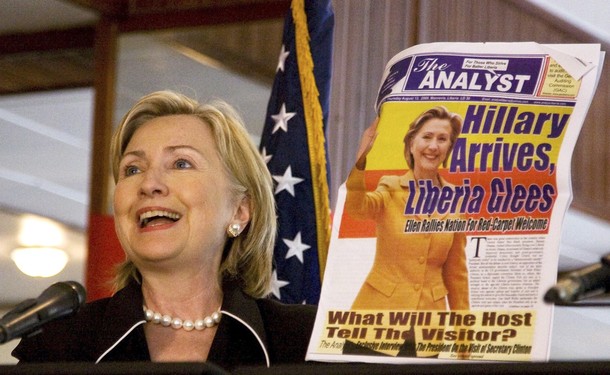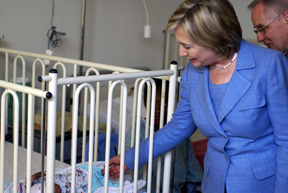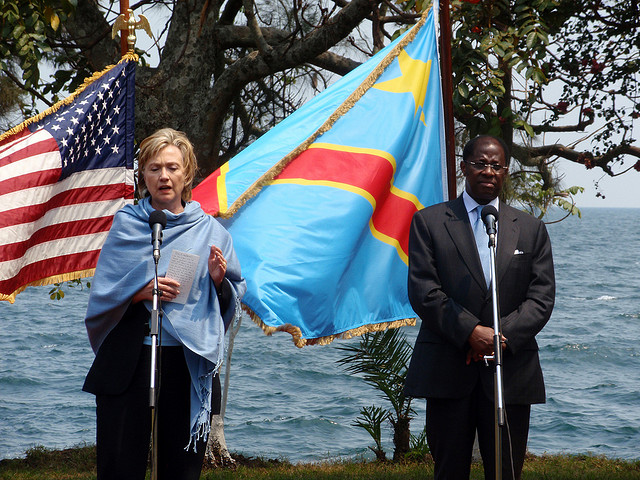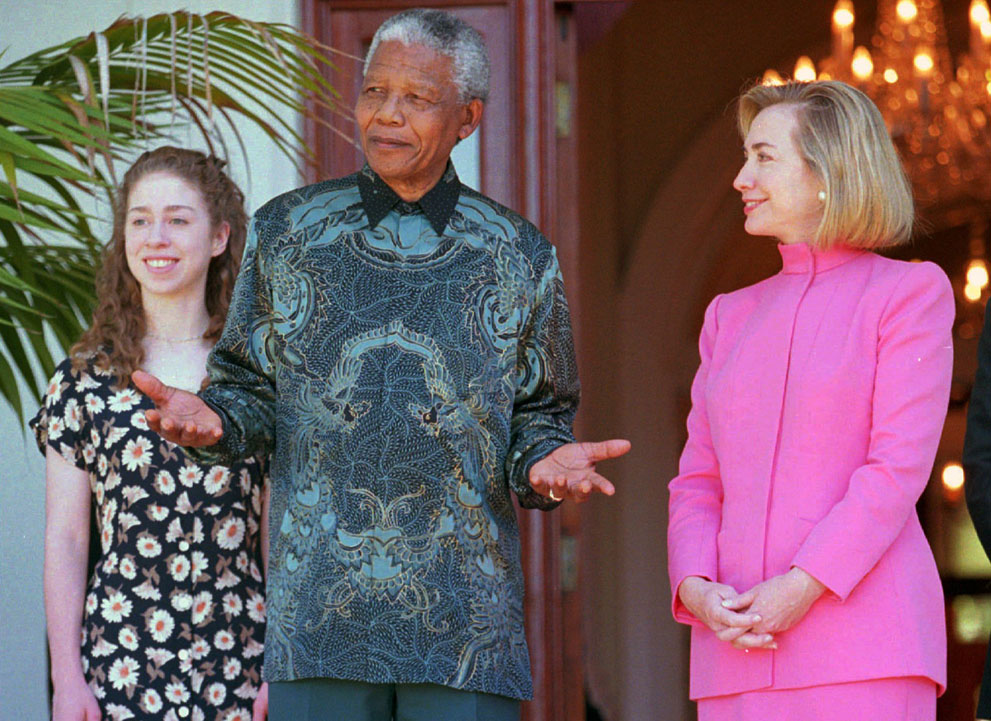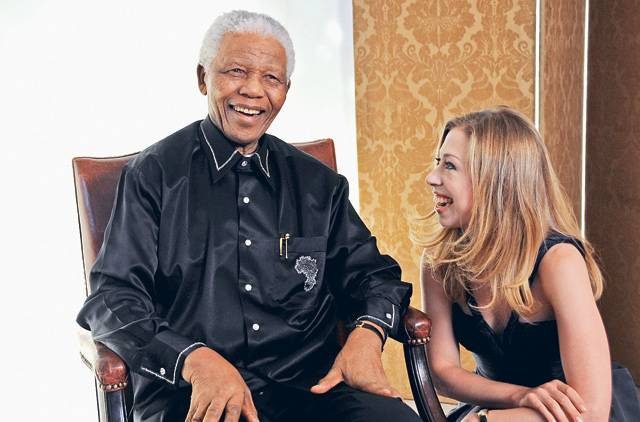- Promoting opportunity and development,
- Spurring economic growth, trade, and investment,
- Advancing peace and security,
- Strengthening democratic institutions.
She quotes her remark to a TV interview question in Zambia in June 2011.
... our view is that over the long run, investments in Africa should be sustainable and for the benefit of the African people.Confronted with a suggestion that the Chinese model, basically a hands-off local government model might serve African nations better than the good-governance model that could be interpreted as imposed by the west, responded:
It is easy – and we saw that during colonial times – it is easy to come in, take out natural resources, pay off leaders, and leave. And when you leave, you don’t leave much behind for the people who are there. You don’t improve the standard of living. You don’t create a ladder of opportunity.
We don’t want to see a new colonialism in Africa. We want, when people come to Africa and make investments, we want them to do well, but we also want them to do good. We don’t want them to undermine good governance. We don’t want them to basically deal with just the top elites and, frankly, too often pay for their concessions or their opportunities to invest.
Hillary Clinton’s Media Outreach: Three Interviews from Lusaka, Zambia
June 11, 2011 by still4hill

She mentions this speech where she spoke of sustainable partnerships that add rather than subtract value.
Hillary Clinton on Building Sustainable Partnerships in Africa
August 1, 2012 by still4hill

On the subject of the disturbing downward trend in electoral democracies on the continent she refers to a speech in 2011 at African Union Headquarters where she warned African leaders that the Arab Spring could spread. We wondered, viewing the video, why she was speaking in the dark. It turned out that there was a power outage that occurred while she spoke that might have been a coincidence. It is a message that older, entrenched leaders do not want to hear. Hillary remarks upon the reluctance of some of these leaders, often seen as liberators from colonialism, to cede power. The phenomenon is endemic on the continent.
She delivered a similar message to Arab elders at Forum for the Future in Morocco in November 2009. Neither was that audience particularly receptive to the message of inclusiveness. The Arab Spring was a reaction to policies that she knew then, through her interactions with civil society in Arab countries, would boil over sooner or later boil over. A look at the slideshow in this post speaks more than 1,000 words.
Video: Secretary Clinton’s Remarks at African Union Headquarters, Addis Ababa
June 13, 2011 by still4hill

Putting forth the example of a grassroots Senegalese movement effectively defeating Abdoulaye Wade in their 2012 election, she posits that democratic change is possible in Africa and quotes further from her sustainable partnerships speech in Dakar.
I know there is sometimes an argument that democracy is a privilege belonging to wealthy countries, and that developing economies must put economic growth first and worry about democracy later. But that’s not the lesson of history. Over the long run, you can’t have effective economic liberalization without political liberalization ... the United States will stand up for democracy and universal human rights, even when it might be easier or more profitable to look the other way, to keep the resources flowing. Not every partner makes that choice, but we do and we will.Liberia, today so unfortunately stricken with the ebola epidemic, stands as a shining example of democracy in Africa as Hillary points out that former enemies on the field of battle now sit side by side in the legislative chambers.
Hillary Clinton’s Address to Joint Session of Liberian National Legislature
August 13, 2009 by still4hill
Some of you have seen a film that tells the story of a Liberian woman’s efforts to end the war. Tired of the killing and the conflict, she organized women at her church and then other churches and in mosques until thousands of Liberian women had joined a vocal, public movement demanding peace ... These were women who woke up one day and said, “Enough, enough. We’re better than that ... I know that the suffering of the people of Liberia has been broad and deep. But now, you each have a chance, both personally and publicly through your service here, to make a stand against the past and for a future that is worthy of the sacrifice and the suffering that went on too long. The United States is proud to support you.
Her 2009 visit to Kenya comprised several important speaking engagements to which she refers: The AGOA Forum (Clinton administration legislation), a "townterview" with Fareed Zakaria, a visit, with Agriculture Secretary Tom Vilsack, to an agricultural research institute, and the usual ministerials.


Hillary Clinton’s Address at the Africa Growth Opportunities Act (AGOA) Forum in Kenya
August 5, 2009 by still4hill
Hillary Clinton’s Townterview at the University of Nairobi with Fareed Zakaria
August 7, 2009 by still4hill
Botswana's national trust fund has reinvested profits from its resources into the population and infrastructure with such success that both the Peace Corps and USAID pulled out of the country since their help was no longer needed. Hillary credits Botswana's Five Ds for the success: Democracy, Development, Dignity, Discipline, Delivery.
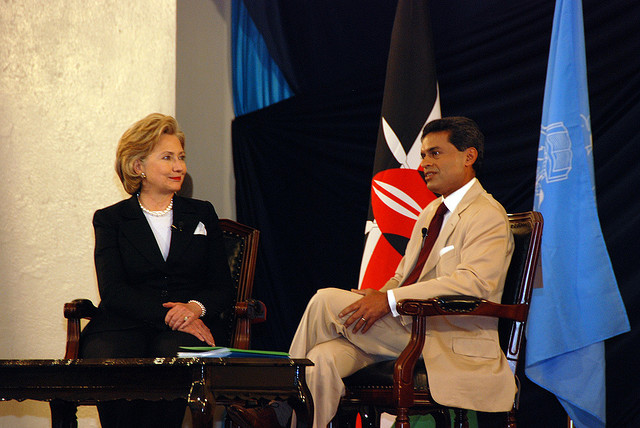
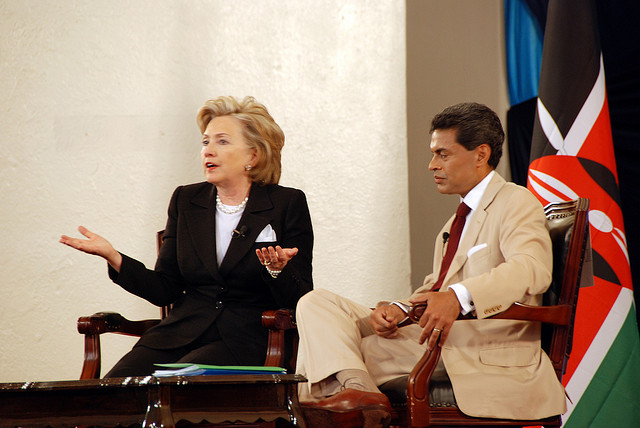
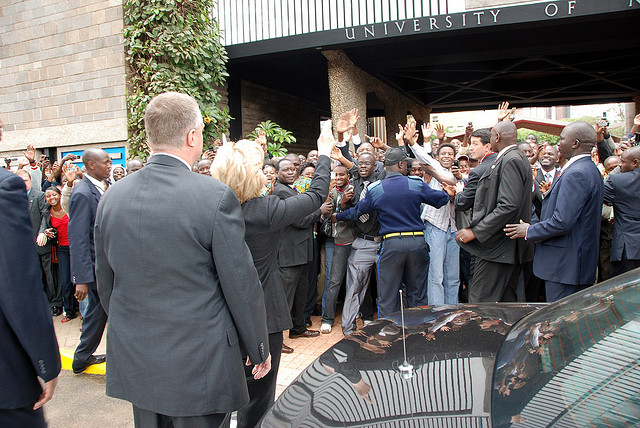
Hillary Clinton at the Kenya Agricultural Research Institute
August 5, 2009 by still4hill
Well-intentio9ned
as they were, she notes that U.S. (and other) gifts of foodstuffs
undercut the market for indigenous agricultural products. She points to
the Feed the Future Program as one that supports local produce and addresses the challenge of transportation.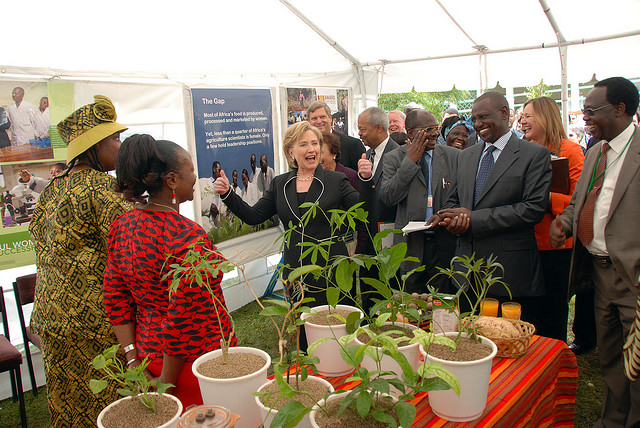

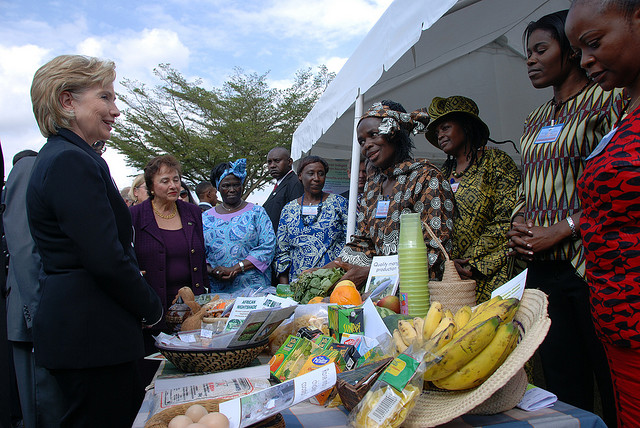
Hillary Clinton With Kenyan Foreign Minister Moses Wetangula
August 5, 2009 by still4hill
She also met with President Kibaki, Prime Minister Odinga, and the cabinet. There was tough talk, to which she refers, in this meeting but no transcript from the State Department. The agreed-upon shared power in the government was not going smoothly. Her subsequent words with Foreign Minister Wetangula provide some insight into the tone she adopted, however.
The United States worked hard last year with Kofi Annan and the team of African Eminent Persons to support the Kenyan people to resolve the crisis that afflicted this country. Unfortunately, resolving that crisis has not yet translated into the kind of political progress that the Kenyan people deserve. Instead, the absence of strong and effective democratic institutions has permitted ongoing corruption, impunity, politically motivated violence, human rights abuses, and a lack of respect for the rule of law.
These conditions helped fuel the post-election violence, and they are continuing to hold Kenya back. The reform agenda agreed to by the coalition government and discussed in the speech that President Kibaki and Prime Minister Odinga gave this morning must be fully implemented not just to avoid a repeat of the previous crisis or worse, but more importantly, to set the stage for a better future, a future worthy of the dynamic people of this country, a future of economic growth, democratic development, social justice, and the opportunity for every Kenyan child to live up to his or her God-given potential. I wanted the leaders to know that we respect greatly the way that the Kenyan people pulled their country back from the brink of disaster once, and the ongoing connection between the private sector, civil society, and the government that is the key to resolving these issues.
Hillary's description of her visit to Democratic Republic of Congo (DRC) in summer 2009 is a contrasting patchwork of horror and hope. She begins with her visit, with NBA star Dkembe Mutombo to the pediatric unit he built and named for his mother.
Hillary Clinton at the Biamba Marie Mutombo Hospital and Research Center
August 10, 2009 by still4hill
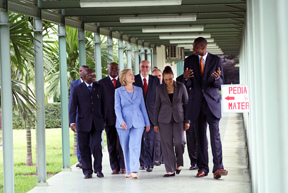
There were so many bright and lovely moments on this first official State tour of Africa. Most of those were, sadly, not covered by the media, but no one missed the "snap in the Congo." In an atmosphere that Hillary describes as sour with an air of sullen resignation in a stuffy auditorium at St. Joseph's School. everyone saw her lose patience with a question, remove her earbuds, and tell a student at a town hall that she would not be channeling her husband.
Hillary Clinton’s Town Hall With Search for Common Ground and Congolese University Students
August 10, 2009 by still4hill
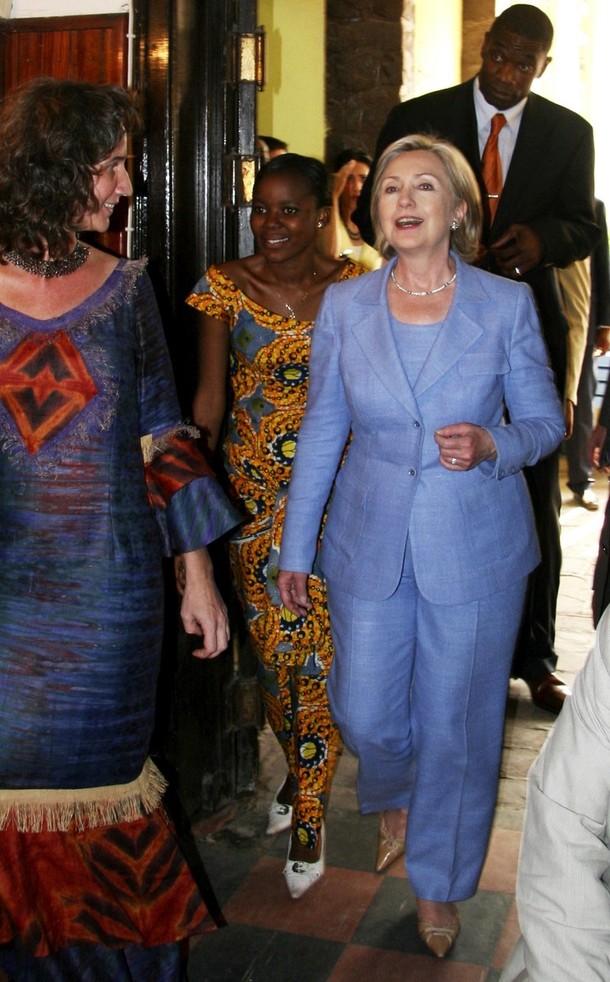
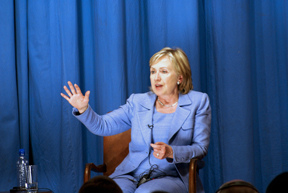
In the book, she explains that the student came to her after the event, apologized, and explained that he had not meant to ask her President Clinton's opinion but rather President Obama's.
Goma is one of the the grimmest, most dangerous places on earth, especially for women. Hillary tells of her visit there and the spirit she encountered among the residents of the refugee settlement she visited.
Hillary Clinton’s Day at the U.N. Internally Displaced Persons Camp, Goma, DRC
August 11, 2009 by still4hill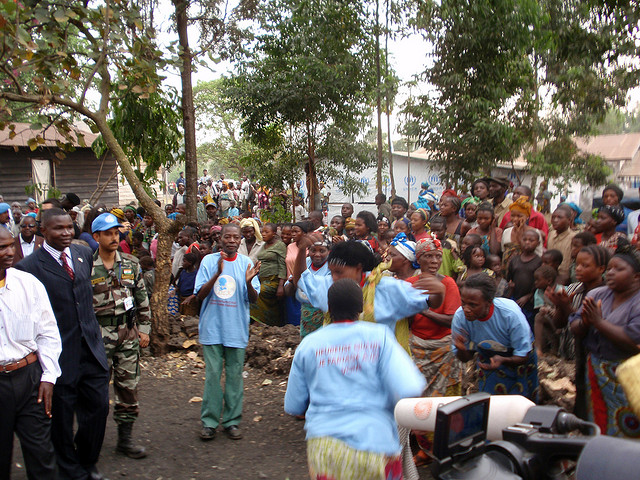
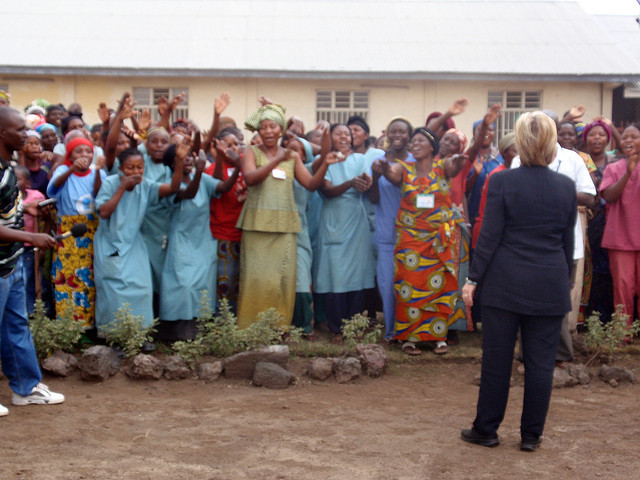
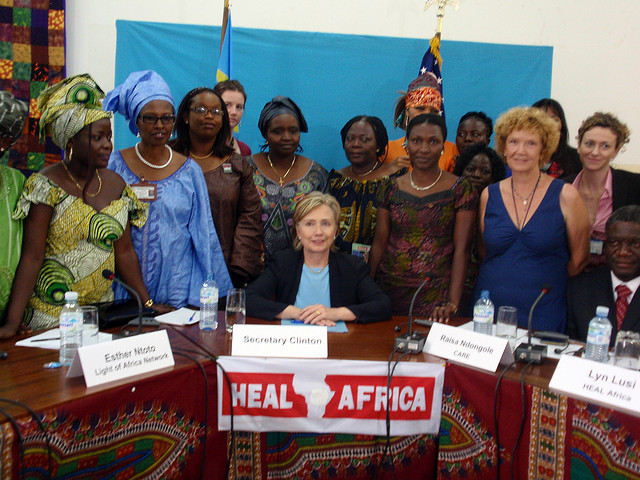
She says she witnessed the worst and the best of humanity there. She was inspired to chair a U.N. Security Council meeting the next month on the subject of sexual violence in conflict regions.
Secretary Hillary Clinton Chairing Security Council Meeting Today
September 30, 2009 by still4hill
Secretary Clinton & Ambassador Rice: Remarks After Meeting on the Adoption of a UNSC Resolution to Combat Sexual Violence in Armed Conflict
September 30, 2009 by still4hill
Hillary
turns at this point to her visit to Africa's and the world's newest
country, South Sudan in August 2012 when a standoff between the breakout
state and Sudan from which it had seceded was festering. South Sudan
had oil and Sudan had the ports and refineries. Clearly some kind of
cooperative agreement would benefit both, but South Sudan had shut down
the pipeline to the North.Hillary Clinton With Foreign Minister of South Sudan Nhial Deng Nhial
August 3, 2012 by still4hill
Hillary Clinton in South Sudan
August 3, 2012 by still4hill

The surface issue was fees charged by Sudan to transport and process the oil. Hillary used an Op-Ed by one of President Kir's former comrades-in-arms, Bishop Elias Taban, once a boy soldier. Below the surface, the dispute rested on old battle wounds. Hillary told him "a percentage of something is better than a percentage of nothing." Taban's words moved Kir to accept a compromise. By 2:45 the next morning, the oil flowed again.
Hillary Clinton Welcomes Oil Agreement Between Sudan and South Sudan, Calls for Peace and Humanitarian Access
August 4, 2012 by still4hill
Hillary
writes that South Sudan's future remains uncertain, and indeed, while
this post was being assembled the State Department issued this statement.Bishop Taban, who provided the instrument that convinced President Kir to budge was her guest at last year's Clinton Global Initiative where she presented him with the Global Citizen Award.
CGI 2013: Closing Plenary Session
September 26, 2013 by still4hill
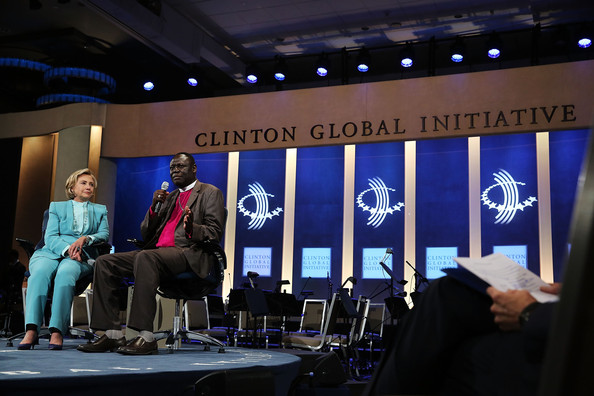
She reviews Somalia's war-torn, terror-ridden history and our efforts to assist through several U.S. administrations. In August 2009, the president of the transitional government traveled to Nairobi to meet with her. She wondered if he would shake her hand, and he did so very enthusiastically which was a very big deal all around.
Hillary Clinton With Somali Transitional Federal Government President Sheikh Sharif Sheikh Ahmed
August 7, 2009 by still4hill
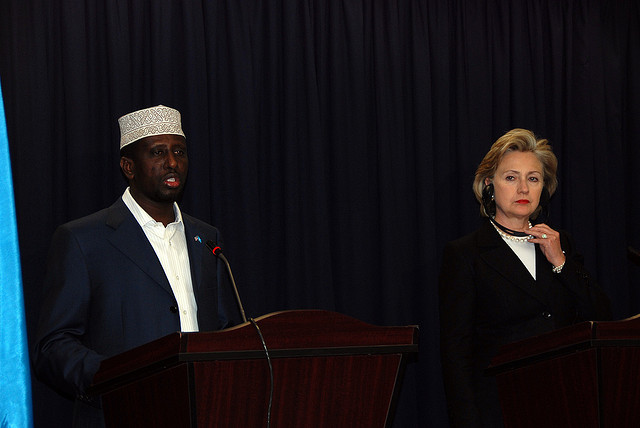
They met again for a final time in their respective official positions in August 2012. A new president was elected the next month.
Hillary Clinton With Somali Roadmap Signatories in Kenya
August 4, 2012 by still4hill

At a military base in Uganda, U.S. Special Operations advisors showed her a surveillance drone used in the search for Joseph Kony chief of the Lord's Resistance Army and elements of Al Shabaab. She notes that it resembled a child's toy.
Hillary Clinton at Kasenyi Military Base in Uganda
August 3, 2012 by still4hill


She mentions the September 2013 attack by Al Shabaab on a shopping mall in Nairobi that killed Elif Yavuz who worked for the Clinton Health Access Initiative which battles HIV/AIDS and other health challenges.
Bill, Hillary, and Chelsea Clinton Offer Condolences on the Death of Elif Yavuz
September 23, 2013 by still4hill

In the struggle to conquer HIV/AIDS on the continent, the President's Emergency Plan for AIDS Relief (PEPFAR) begun by George W. Bush plays a major role. She recalls this event in Johannesburg in 2009 where she was accompanied by Eric Goosby, the State Department's Global AIDS Coordinator, her Congressional Representative, Nita Lowey, and the late, Honorable Donald Payne who was a friend of this blog.
Hillary Clinton at PEPFAR Event in South Africa
August 8, 2009 by still4hill
Hillary declared a goal of an AIDS-free generation on World AIDS Day 2011.
Secretary Clinton on World AIDS Day 2011
December 1, 2011 by still4hill
Hillary Clinton at the Reach Out Mbuya Health Center, in Kampala, Uganda
August 3, 2012 by still4hill

Hillary begins drawing this Africa chapter to a close in South Africa around Nelson Mandela beginning with recollections of her visits to South Africa as First Lady, the second time bringing Chelsea with her. A lifetime friendship ensued.
Hillary Clinton with Nelson Mandela
August 8, 2009 by still4hill
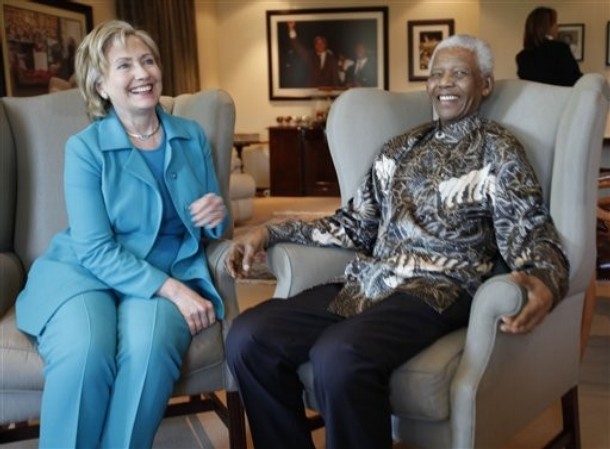
One working relationship that brought many smiles over the years was her friendship with South African Foreign Minister Maite Nkoana-Mashabane. She gave parties for Hillary on both of her visits. There was a rare snowfall on Hillary's last visit and she was called 'Nimkita' - one who brings the snow.
Hillary Clinton With South African Minister of International Relations Nkoana-Mashabane
August 8, 2009 by still4hill
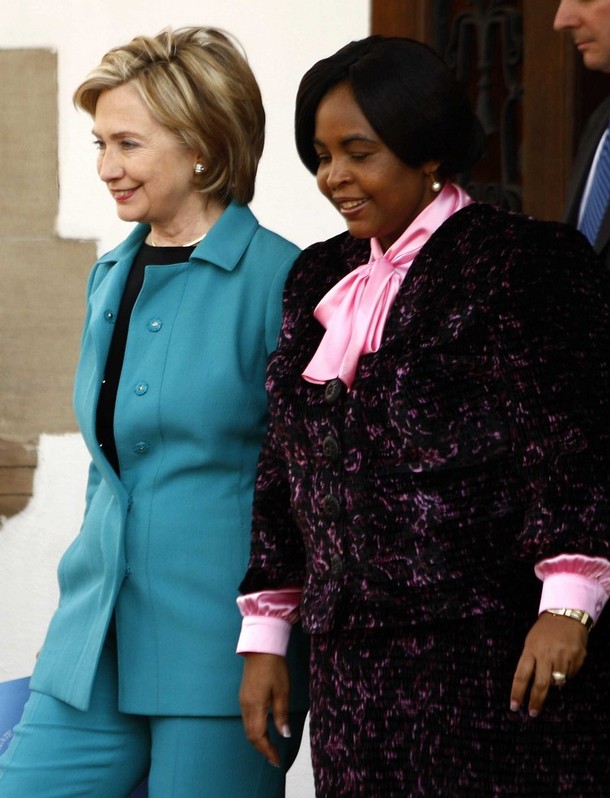
Hillary Clinton with South African Foreign Minister Maite Nkoana-Mashabane
August 7, 2012 by still4hill

Hillary Clinton’s Meeting With U.S. and South African Business Leaders
August 7, 2012 by still4hill
Hillary Clinton at a Dinner Hosted by South African Foreign Minister Maite Nkoana-Mashabane
August 7, 2012 by still4hill

Hillary Clinton at the U.S.-South Africa Business Partnership Summit
August 6, 2012 by still4hill
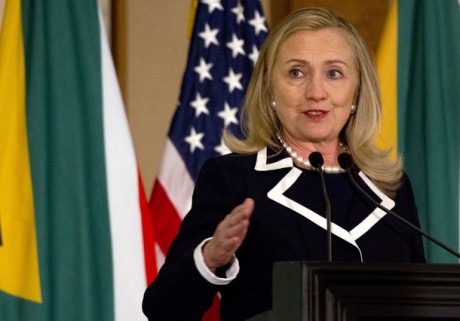
There was one last visit to Nelson Mandela.
Hillary Clinton Visits Nelson Mandela
August 6, 2012 by still4hill
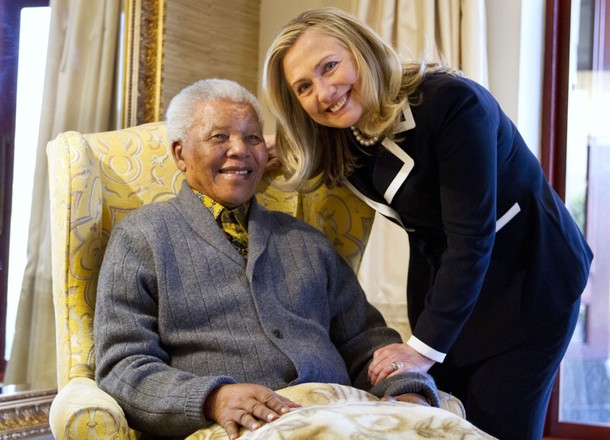
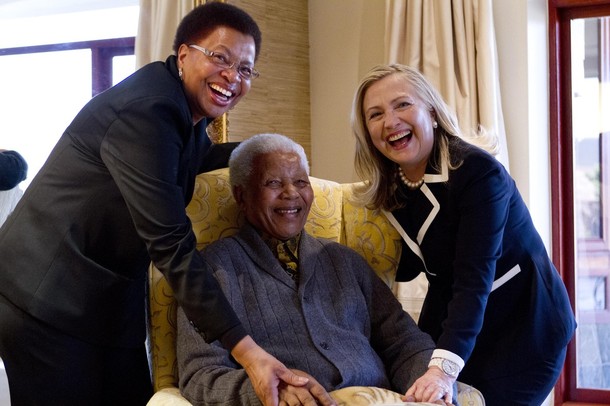
Hillary Clinton at The United States – South Africa Partnership
August 8, 2012 by still4hill

She refers to these closing remarks in this speech.
It’s a burden being an American or a South African, because people expect you to really live up to those standards. People hold us to a higher set of standards, don’t they? And we owe it to all who came before, all who sacrificed and suffered, to do our very best to keep working every single day to meet those standards. But we mostly owe it to our future.
Many things have changed since Robert Kennedy came to Cape Town and Nelson Mandela left Robben’s Island. But some have not. The world we want to build together still demands the qualities of youth and a predominance of courage over timidity. So in that spirit, let us work together so that the values that shaped both our nations may also shape a world that is more peaceful, more prosperous, and more just.
Clintons Close CGI in Rio and Convene in South Africa to Honor Nelson Mandela
December 10, 2013 by still4hill
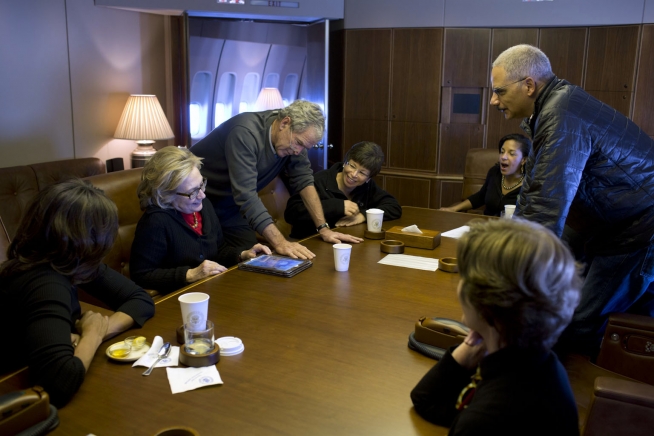
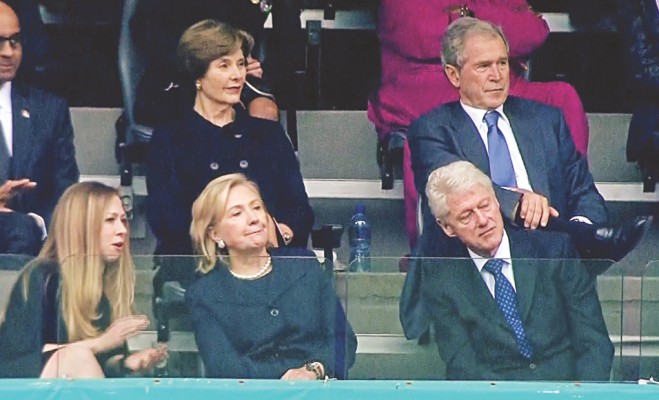
Hillary ends this chapter with hopes for an Africa worthy of Nelson Mandela's long walk to freedom.
###

